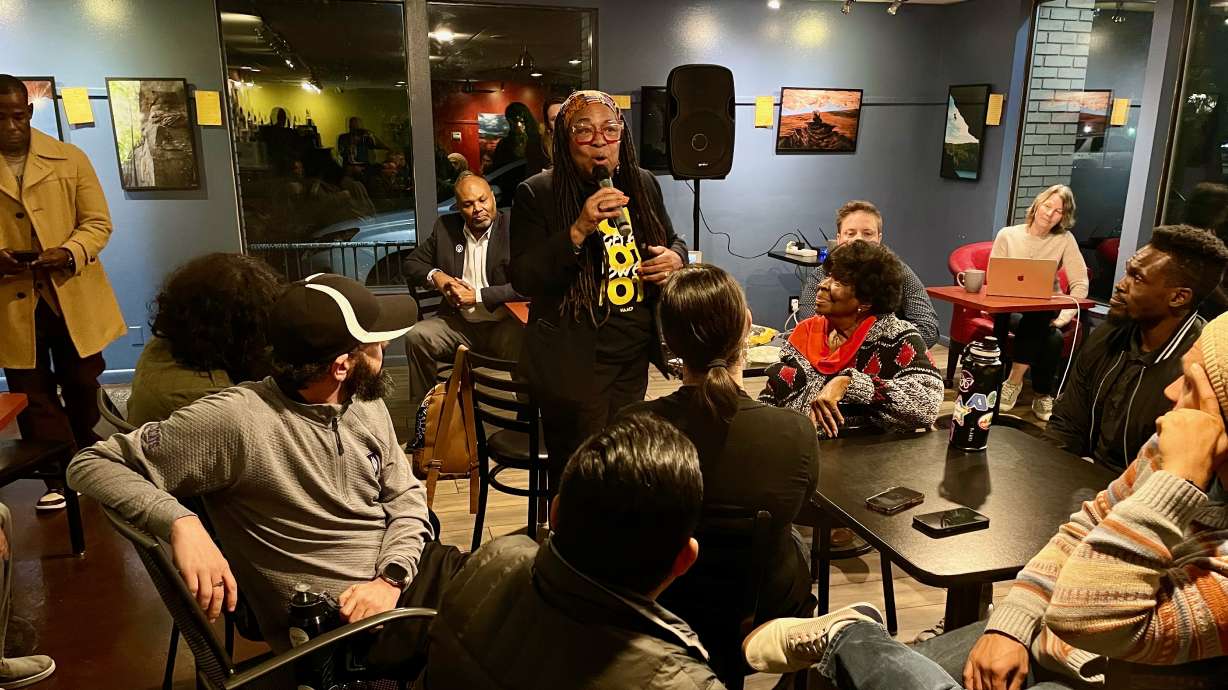Estimated read time: 3-4 minutes
This archived news story is available only for your personal, non-commercial use. Information in the story may be outdated or superseded by additional information. Reading or replaying the story in its archived form does not constitute a republication of the story.
- Critics gathered in Ogden to voice concerns with HB261, the measure eliminating diversity initiatives at Utah universities.
- They worry about the impacts, fear continued action and want their message to be heard by Utah's powerbrokers.
- HB261 proponents say the sort of programs provided via diversity initiatives should be accessible to all students.
OGDEN — They gathered to share stories about HB261 and its impact, to discuss possible options to counter the controversial legislation, which eliminates diversity initiatives at Utah's public universities.
Mainly, the contingent — called to an Ogden coffee shop by Betty Sawyer, head of the Ogden Branch of the NAACP — blasted the measure as a blow to efforts to help marginalized students. Though the measure passed with overwhelming support from the Republican-led Utah Legislature last January, those on hand Wednesday evening — including many with connections to Weber State University in Ogden — had only sharp words.
"These are safety nets, safety nets that were removed," said Linda Lartigue, whose deaf daughter benefitted from the type of diversity, equity and inclusion programs targeted by HB261. "If there weren't these things in place to help kids that don't have the same abilities or the same outcomes that every other child has, then I don't know where she would be. She wouldn't have just graduated college. She wouldn't be getting ready to apply to grad school."
Barrett Bonnella, a Weber State professor, said he's been dwelling on the measure all summer and fall.
"My child is a university student now, and there are centers that he should have had access to, but he doesn't now," he said. "What has gotten to me the most is that I see the writing on the wall. There is more coming."
Sawyer said she's hearing stories from many worried about what they believe to be the adverse impacts of HB261, and the aim of the meeting Wednesday evening was to air the concerns in an open setting. She wants the message heard by Utah lawmakers and other powerbrokers, a theme echoed by others.
"We're all having conversations in our own places and spaces. But my concern was that if we don't have these kinds of conversations, those that pass this kind of legislation will feel emboldened to do even more," she said. Those concerned with HB261 "have to be ever vigilant in telling our story and coming together and pushing back against this because we see what the powers that be are. And if you think they're done, unfortunately, I don't think so."
HB261 proponents argue that diversity programming, geared to minority and traditionally marginalized students, ought to be available to all students in need, regardless of their race, ethnicity, sexual orientation, or other personal identifiers. Defenders of diversity initiatives counter, saying diversity initiatives help marginalized students find space and acceptance in the university setting. HB261 led Weber State and the University of Utah to shutter cultural centers geared to black, female and LGBTQ students, among others, another sore point for critics.
Utah Rep. Rosemary Lesser, D-Ogden, attended, saying the sort of conversation held Wednesday needs to be held around the state. She voted against HB261 along with the rest of the Democratic minority in the Utah Legislature.
"We need to have every community rising up and talking about the implications and inviting those people who voted in favor of this because they need to see what happened. I knew what was going to happen, but we need to have every representative who voted yes for this to understand the consequences of what they did," Lesser said. She's facing a challenge this cycle from Republican Jill Koford.
Jordan Marshall, a Weber State freshman, lamented the fact that he was never able to tap into the diversity initiatives the college used to offer, including the now-shuttered cultural centers.
"Now, coming into Weber, you know, as a first-year student, just seeing what has gotten taken from me and what has gotten taken from everyone. Heartbreaking — you know what I'm saying?" he said. "For me, it's just heartbreaking to know that it was snatched so fast and people worked so hard for it."
Chuck Wight, the president of Weber State from 2013 to 2018 but now retired, attended, also lamenting the passage of HB261.
"A lot of the progress that we made was undone in that one legislative stroke," he said. "Diversity, equity, inclusion and justice are not liberal values. They are American values."









